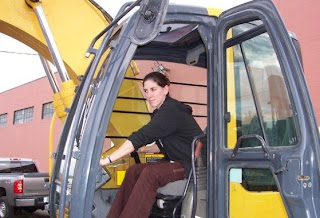
So, after our lesson about Google analytics, I was eager to try it our in real time.
I work for a small company that sells and rents heavy equipment for construction, and this is the slow season. There are still people out there looking, but it's a matter of successfully connecting with those few buyers. We are at a point where we must reduce our inventory, so some of the equipment may have to go to auction. The salesman (my boss) and I are adverse to this idea, knowing that we will experience a financial loss if we go this route, so we've been stepping up the pace to bring in more prospects.
So, I told my boss about Google's analytics, asking if I could use the company credit card for the pay-per-click feature, but he said he didn't think it would be worth it. I didn't like that answer, so on my own time and with a small budget, I tried it out. Of course, in my imagination, calls would suddenly come pouring in, and my boss would wonder what kind of ethereal force was at work to bring about such a mysterious change, and he would tell me about all the prospects who had called him over the weekend. Then, when I describe my Google ad campaign, he would be forced to admit that he was wrong, and I would be showered with praise and bonuses. (My adult mind knows better, but a girl's got to dream).
Here's what I found:
I put in 78 keywords, including industry jargon and common misspellings from e-mails I have received over the years, and makes and model numbers. After it had been active for 2 hours, I looked at the report and found that the ad had been shown 994 times, and had 4 clicks. Although this represented a .04% success rate, I was happy about the four clicks. As of this evening, the ad has been shown 6719 times and has had 12 clicks. The words Hitachi, John Deere/JD and Cat/Caterpillar got the most hits. (I found out that if you Google "cat"-- even if you're looking for the feline kind-- the first site to appear organically is Caterpillar's home website. I guess that means that there are more people searching for Caterpillar products than domestic cat-related topics/products).
For the sake of curiousity, I intend to leave this campaign going for another week, and maybe I'll change the ad to appear only regionally, and see how that changes the results. If anyone has any other ideas for how I can manipulate this ad in other ways, I would love to hear suggestions.
Anyway, I thought it was a fun experiment, and I'll be sure to report back if it appears that business seems to improve slightly. Or maybe it will be obvious when I start arriving at school in a limo.

4 comments:
Hey Chelle,
What did we do in class today? Can you catch me up a little?
Brent
Great post.
When I worked at Ruth's Chris Steak House we had a financial-retirement company that hosted promotional seminars at the restaurant. They would send out 6,000 postcards advertising the event. If they were lucky, they would fill seventy seats, and that's with a free steak dinner!
By the way, I'm pretty sure Caterpiller pays to have such a high search ranking.
You can't pay Google for good organic rankings. They won't take your money. Really. That's because Google is altruistic and munificent in addition to omniscient... No, really. It would completely undermine the effectiveness of their search engine. Probably the high organic ranking of CAT has to do with it being the ticker symbol for the stock, and all those people obsessively checking their stock portfolios to see how far they plunged in worth since the last time they checked, twelve minutes ago.
The difference between the Ruth's Chris Steakhouse postcard mailing and the Google Adwords is that Ruth's Chris Steakhouse actually paid to print and mail every one of those 6000 postcards. Chelle didn't pay for the 6719 ad views. She only paid for the 12 clicks. (Also, of course, Ruth's Chris Steakhouse is a ridiculous name for a restaurant, whereas heavy equipment is... well... cool.)
I had dinner once with someone from Motor Books in Minnesota. They specialize in books about cars. And tractors. He confided to me that anything with a John Deere tractor on the cover sells like crazy. I would guess that you are probably getting a fair number of those tractor freaks, who aren't necessarily great prospects for you.
I think the geographic targeting is a good idea. (Unless people come from the east coast to buy machinery? I doubt it, but I wouldn't know...) Also, you should experiment with narrowing your keywords to get more of the people who are actually in the market for heavy equipment, as opposed to the people just checking their portfolios and pipe dreaming about John Deere tractors. I'm not sure how you would do this, exactly, as I don't know what words you're using. Bring in your list, OK?
Also, if you haven't already, be sure to test different versions of the ad in the same AdWords campaign...
Marty, don't tell me you're one of those who doesn't like animals enough to eat them..?
Seriously, I'm convinced that part of Ruth's success (from a marketing standpoint) is the name. It's a name that you remember, or at least, a name you remember you can never remember. Of course, there's a story behind it, and once people heard the story, they weren't likely to forget the name. Or think it was stupid.
Post a Comment